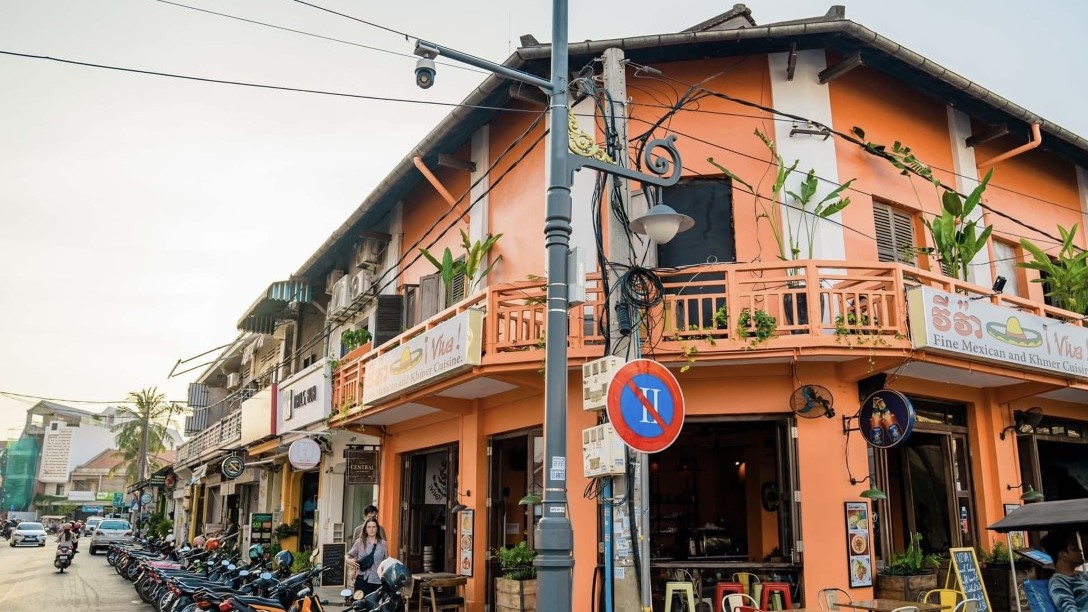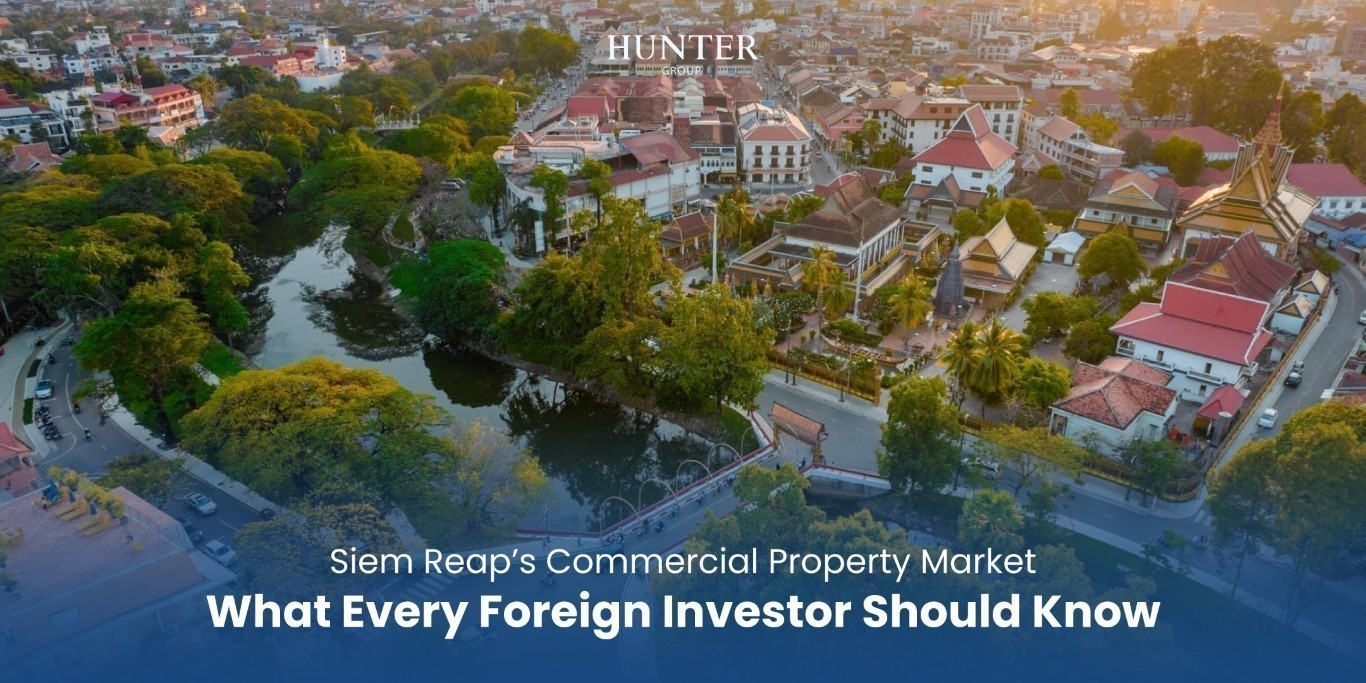Cambodia's real estate market stand out in South-east Asia due to its affordability, providing investor to enter market with low price compared with other countries, with stable economy and stability growth. Cambodia has become an attractive investment destination with one of the most manageable inflation rates (averaging just 2.9% over the past decade) and stable foreign exchange rate in Asian, making it the best options for investment for those seeking profitable opportunity for investment, Cambodia political stability sustain for a half a century, offer low risk investment both on currency stability, countrywide. Siem Reap city, with nearly 1 million residents, is rapidly growing, attracting more tourists and investment every year. With vibrant culture dynamic landscape unique mixture between ancient charming modern growth, it makes itself prestigious destination among trending Nitch tourism market.
 Market overviews for foreigners
Market overviews for foreigners
Although foreigners are prohibited from owning a land in Cambodia, there are ways for a foreigner to own or have rights to land property such as long-term lease of up to 50 years (renewable for another 50 years), forming a landholding company or taking the minority stake, marrying a Cambodian, acquiring a Cambodian citizenship, investing through land concession, or buying through a nominee. The country’s GDP is on the rise and is expected to grow by 5.8%-6% in 2024 and 2025, the local real estate market has been growing consistently offers rental yields of 4-8% and foreigners can buy property based on the type of property due to complex of several restrictions.
Here are key factors foreigners need to know:
 Legals Restriction
Legals Restriction
Generally, the strongest proof of ownership is a property title under your name. With locals, the most secure type of title they can hold onto is a hard title. Compared to soft titles which are only registered and recognized at a local government level, hard titles are recognized by the Ministry of Land and the cadastral office at a national scale and are provided by the Land Management and Planning Office.
Under the hard title category, lies the LMAP title and Strata title (Land Management and Administration Project Title). For foreigners, only strata titled properties can be owned under their name. Once the purchase is done, foreigners will be given the original copy of the title and will be 100% entitled for the rights and obligations to the property. (Source: realestate.com)
Foreigners are not allowed to own land outright in Cambodia. However, they can own 70% of the buildings on the land such as a condominium complex, means that at least 30% of the units in any given building must be owned by Cambodian ownership and can be leased for long periods (up to 50 years, with options to extend). According to Article 44 of the Cambodian Constitution and the 2001 Land Law, foreigners are prohibited from owning land in Cambodia. This applies to both foreign individuals and foreign-owned companies. In other words, foreigners planning to buy property in Cambodia can own apartments and condominiums that are not on the ground floor.
However, that is not the only option. Despite these restrictions, there are some other ways for foreigners to own land and property in Cambodia while staying compliant with the local laws. A well-drafted lease agreement is crucial for protecting the interests of both partners. provides clear expectations regarding responsibilities, rights, and obligations, which helps to prevent misunderstandings and legal disputes.
 Navigating Lease Agreements for Foreign Investors
Navigating Lease Agreements for Foreign Investors
For those interested in landed properties or commercial real estate, a suitable option is long-term leases. Foreigners can enter into lease agreements for land, houses, or commercial properties, typically for periods of 50 to 99 years, with the possibility of renewal.
In addition to long-term leases, another option that is often used by foreigners in Cambodia is to use a trusted Cambodian citizen as a nominee to purchase property on their behalf. However, this approach carries significant risks as you are not the legal owner of the property, and you have to rely heavily on trust. If you are a foreign investor looking to rent commercial property of any type in Siem Reap or elsewhere then the laws and practices need to be understood properly so at least your investment is safe. There are a variety of rules dictating how lease agreements should be written, and not following them can cause you to get into disagreements and lead to disputes or financial loss. Consulting with legal professionals who specialize in local property laws is highly advisable They can help you make sure your lease is detailed and legally sound, navigate the pitfalls of leasing land by working with legal experts, you can craft a lease agreement that protects your interests.
 Market research and financial option
Market research and financial option
Before investing, it’s important to analyze the local market trends, including demand for commercial space, rental rates, and the competitive landscape in defying target and analyzing local demand. Studying the property market helps investors with deep insights and data to make the right decisions, such as the right time for buying or selling the properties, negotiating prices, and choosing the right investment strategy. Market research in Krung Siem Reap uncovers the unique challenges and opportunities with its rapid development, growing local economy, businesses need a clear understanding of consumer behaviors, competitive landscapes, GDP and market rental trends, provides crucial insights, and marketing strategies to meet local demands. Foreigners interested in buying property in Siem Reap have a few financing options, each with unique terms and conditions. including bank loans and developer loans. While bank financing options for foreign nationals are limited, there are still some banks that offer mortgages to expatriates., for example, The Cambodia Development Bank offers the Foreigner’s Home Loan program specifically designed for foreigners looking to purchase property in Cambodia. Additionally, developers often provide their financing options, allowing foreigners to secure a loan directly from the developer. Foreigners seeking to obtain a mortgage in Cambodia must meet general requirements, as well as additional criteria depending on their employment status. Additionally, they may be required to provide a down payment ranging from 30% to 70% of the property’s value. It is important for foreigners to carefully review and meet these requirements before applying for a mortgage in Cambodia.
 Tax implication
Tax implication
Cambodia, owners must pay back 0.1% to 0.2% of the value of the property every year as a property tax, plus a registration fee (4%). Rental income from renting out the property is taxed at maximum rate of 20% but you can deduct on certain expenses linked to the property.
However, if you sell the property, there is a 20% tax on any capital gains. A Value Added Tax (VAT) of 10% is also due for new developments. Foreign investors also must look out for a 14% withholding tax on dividends and profits made from Cambodian companies. However, Cambodia did charge a double taxation which has made it foreign channeled income falling under double taxation from the tax situation. Financial option Non-residents are taxed at a flat rate of 20%, which constitutes a financial tax. Since tax laws can be quite complex, it’s a good idea for new investors to consult with local tax advisors or legal professionals. These experts can guide you through the process and help ensure that your investment in Siem Reap runs smoothly.
Importance of Local Professional Assistance for Foreigners
The process of buying property in Cambodia typically involves working with a real estate agent or agency. It is advisable to seek assistance from an experienced real estate agent and a reputable company to guide you through your acquisition. The real estate agent or agency acts as a mediator between the buyer and seller, handling payments, negotiations, and other matters. They also ensure that the property documents are legitimate by conducting due diligence. Once all documents are verified, the agent will prepare a Sales and Purchase Agreement (SPA). This legally binding document outlines the terms and conditions of the transaction. It includes details about both the buyer and seller, a description of the property, the sale/purchase price, payment terms, ownership registration, and handover details.
In Conclusion, Cambodia real estate market is one of the unique places for international investor, who looking for reasonable place to investing, Siem Reap one of the wondrous rise places at Cambodia. It is one of the most attractive investment destinations in Southeast Asia with its low cost of living, stable economy, and relatively low inflation rate. However, foreign ownership is legally restricted, so foreign buyers can only lease land long-term, own units of a condominium above the ground floor, or financing new structures with a developer and select certain banks that are available. Foreign investors must conduct diligence, be aware of special tax consequences, and seek help from local experts. Staying within the bounds of law and minimizing risks and phenomenon of dealing with real estate agents and legal advisors reduces risks and increases the investment prospects of the potential of such a promising market.
Where to contact real estate agencies?
Hunter Estate agency established over 300 deals, including $5M+ investment in Siem Reap, offer property consolation, project sale, investment management, developing over sign and legal advisory services. Hunter Estate Agency is committed to partnering with clients to help achieve their real estate goals. We ready to be your Collaborative partners.
